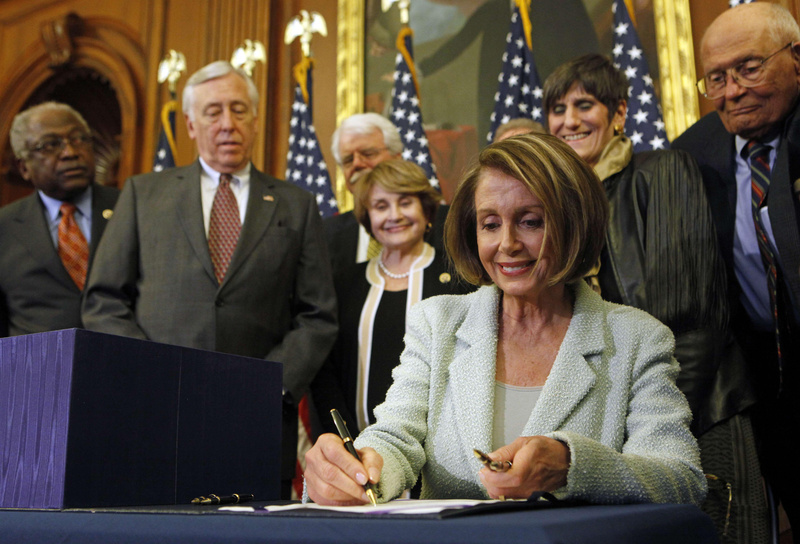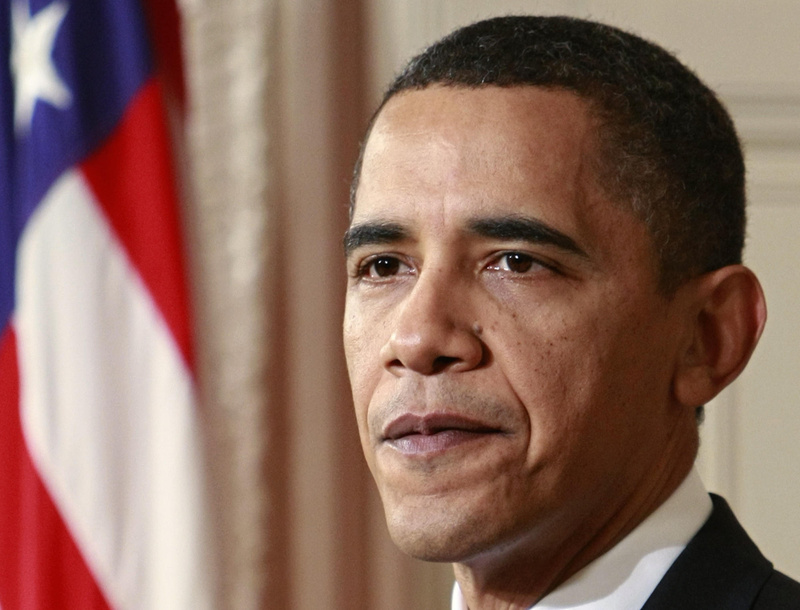WASHINGTON – President Obama scheduled a White House signing ceremony today for landmark health care legislation that passed the House on Sunday, as Democrats and Republicans began shifting their focus to November elections that seem certain to become a referendum on the most significant social legislation enacted in half a century.
The Senate prepared to take up final changes to historic health care legislation that gave Obama the biggest victory of his presidency, with Democrats hoping to complete work late this week. But both sides made it clear Monday that the battle on the package is far from over.
Republicans will make a last push this week to derail the package of fixes to the legislation in the Senate. White House officials said the president will continue to take his case to the country, with a trip Thursday to Iowa as the first of what are expected to be repeated appeals to the public to take a fresh look at the overhaul.
As Republicans prepared to campaign on a vow to try to repeal the measure, Obama and the Democrats will work to keep voters focused on the new benefits, rather than the size, cost or complexity of the bill.
“The real political battle over health care reform begins after its passage,” said Democratic strategist Chris Kofinis. “We can’t let Republicans seize the message advantage here, as they did during last summer’s ‘tea party’ and town hall protests. For Democrats, it means we must take the initiative and aggressively sell this reform to the American people not for a few days, or weeks, but all the way through the election.”
Other issues, like the economy, may loom larger by November than the debate that has raged for more than a year over Obama’s health initiative. But health care will become a proxy, say strategists in both parties, for the continuing debate over whether the Obama era represents a return to bigger and more intrusive government.
One measure of that came in a statement from Gov. Mitch Daniels, R-Ind. Saying the measure will raise taxes and, contrary to projections, add to the national debt, he said: “In a life of optimism about America and its future, this morning I am as discouraged as I can remember being.”
Both parties confront new tests after Congress’ action. Democrats must motivate and persuade voters who, for varying reasons, have been turned off by the long debate on Capitol Hill and the president’s policies.
Republicans must show that their dire predictions about the impact of the legislation are real and not just the politics of fear and opposition. Most concede that a strategy that focuses only on repeal and does not acknowledge the need to change the health care system is unlikely to be a winner.
Obama and party leaders face two challenges. First, they must motivate a Democratic base that for months has been demoralized and divided over whether the health care legislation lived up to their expectations for change. Second, they need to win back the independent voters who backed them in 2006 and 2008 but shifted sharply to the GOP in the off-year gubernatorial elections in Virginia and New Jersey and the special Senate election in Massachusetts two months ago.
Pollster Peter Hart argued that the first priority, given that midterm elections are often decided by which side is more motivated, should be invigorating the Democratic base.
“The most important thing for them is to develop interest. I think a ‘yes’ vote and a Democratic victory helps to change that dynamic,” Hart said.
He cited results from a recent NBC News-Wall Street Journal poll showing that, among the most motivated voters, Republicans held a double-digit lead on the question of which party those voters plan to support in House elections in the fall.
Democratic officials said that passage of health care will give Obama a boost in the eyes of the public.
“Part of the test here at the end wasn’t this policy or that policy,” White House Chief of Staff Rahm Emanuel said. “It was, ‘Did he have the capacity to deliver?’ That question mark around him and the presidency has been answered.”
Based on historical evidence, any rise in Obama’s approval ratings will have a direct and positive effect on his party’s success in the fall elections.
Republicans lost the health care battle in Congress but still think they hold the high ground politically, especially in districts likely to be competitive this fall.
Public Opinion Strategies, a Republican polling firm, conducted a poll in the districts of 36 Democrats who voted against health care legislation last November.
In 2008, Republican John McCain carried 29 of those districts over Obama.
The survey found that 60 percent of those surveyed in those districts opposed the health care bill and 35 percent favored it, with nearly half saying they were strongly opposed.
White House senior adviser David Axelrod said that, for all Democrats, passage lifts a potential burden in their re-election campaigns.
“If the bill had failed, every one of these candidates who voted for it would have been stuck with a caricature of the bill that would have been potentially politically debilitating,” he said, adding, “All these sky-is-falling predictions won’t materialize.”
In the morning-after analyses, at least one prominent Republican commentator questioned his party’s strategy of outright opposition to the health care bill. David Frum, who was a speechwriter for President George W. Bush, said the health care debate amounts to the party’s “most crushing defeat” in four decades.
Frum went on to argue that Republicans may be overly optimistic about their chances of major gains in November, and said the GOP has only itself to blame for what has happened.
That is a distinctly minority view.
“I don’t think Republicans have miscalculated,” said Carl Forti, a GOP strategist.
“They played this extremely well and opposed the bill with success.
” While every bill may have a few positive things in it, overall this bill is a bad bill, and for the Democrats in GOP-leaning seats, it’s going to be a vote that’s hung around their neck like Hester Prynne and her scarlet A,” Forti said.
But, said Axelrod: “I think the debate shifts now. The issue for those talking about repeal is whether they’re going to look the small-business people in the eye or the children and say this was a horrible (bill). I’m happy to have that debate.”
Send questions/comments to the editors.




Success. Please wait for the page to reload. If the page does not reload within 5 seconds, please refresh the page.
Enter your email and password to access comments.
Hi, to comment on stories you must . This profile is in addition to your subscription and website login.
Already have a commenting profile? .
Invalid username/password.
Please check your email to confirm and complete your registration.
Only subscribers are eligible to post comments. Please subscribe or login first for digital access. Here’s why.
Use the form below to reset your password. When you've submitted your account email, we will send an email with a reset code.